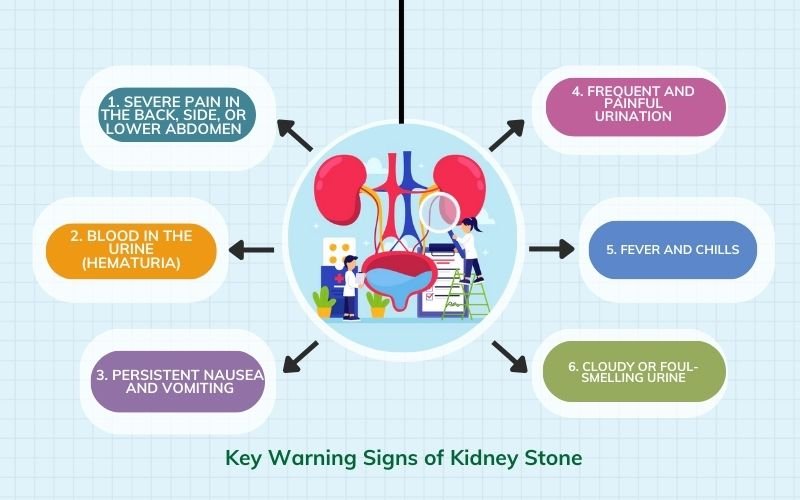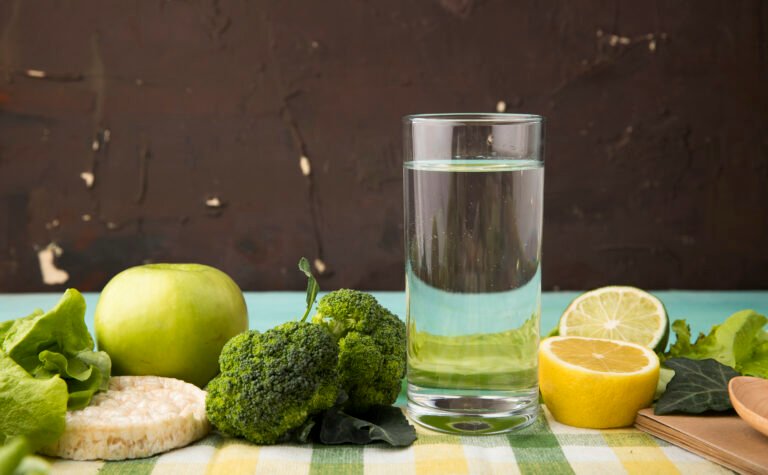Kidney stones can cause significant discomfort and lead to serious health complications if not treated promptly. Dr. Bivek Kumar, a renowned kidney stone specialist in Kolkata, emphasizes the importance of recognizing the warning signs that indicate the need for specialist intervention. Understanding these signs and seeking timely medical care can prevent severe health issues and improve your quality of life.
Understanding Kidney Stones
Kidney stones are solid deposits consisting of minerals and salts that develop within the kidneys. They can vary in size and cause severe pain and complications if not treated. Common types of kidney stones include calcium oxalate stones, uric acid stones, struvite stones, and cystine stones.
Key Warning Signs

1. Severe Pain in the Back, Side, or Lower Abdomen
One of the most common symptoms of kidney stones is severe pain, often described as the worst pain a person has ever experienced. This pain typically originates in the back or side and may radiate to the lower abdomen and groin. The pain can come in waves and vary in intensity, making it difficult to find relief .
When to Seek Help: If you experience sudden, intense pain in your back or side, it’s crucial to consult a kidney stone specialist like Dr. Bivek Kumar. Persistent pain that doesn’t improve with over-the-counter pain relievers is a clear indicator that you need professional medical evaluation.
2. Blood in the Urine (Hematuria)
Blood in the urine, or hematuria, is another significant warning sign of kidney stones. This condition occurs when the stone irritates the urinary tract, causing bleeding. Your urine may appear pink, red, or brown, indicating the presence of blood .
When to Seek Help: If you notice blood in your urine, contact a kidney stone specialist immediately. Hematuria can be a sign of a serious condition requiring prompt medical attention.
3. Persistent Nausea and Vomiting
Kidney stones can cause persistent nausea and vomiting due to the severe pain they induce. These gastrointestinal symptoms can make it challenging to keep food or fluids down, leading to dehydration and further complications .
When to Seek Help: Persistent nausea and vomiting associated with severe pain warrant immediate medical attention. A kidney stone specialist can help manage these symptoms and provide appropriate treatment.
4. Frequent and Painful Urination
Frequent urination and a burning sensation during urination are common symptoms of kidney stones. These symptoms occur when the stone moves into the lower urinary tract, causing irritation and discomfort .
When to Seek Help: If you experience frequent, painful urination accompanied by severe pain in the back or abdomen, consult a specialist. These symptoms can indicate the presence of kidney stones or a urinary tract infection.5. Fever and Chills
Fever and chills can occur if a kidney stone causes an infection. This situation is particularly serious, as untreated infections can lead to sepsis, a life-threatening condition .
When to Seek Help: If you develop a fever or chills along with severe pain and other kidney stone symptoms, seek immediate medical attention. A kidney stone specialist can diagnose and treat the infection effectively.
6. Cloudy or Foul-Smelling Urine
Cloudy or foul-smelling urine can indicate an infection or the presence of a large kidney stone. These changes in urine appearance and odor should not be ignored .
When to Seek Help: If you notice any changes in your urine’s appearance or smell, consult a specialist. Early diagnosis and treatment can help prevent further complications.
Risk Factors and Complications
Who Is at Risk?
Certain factors can increase the risk of developing kidney stones, including:
- Dehydration: Not drinking enough water can lead to concentrated urine, increasing the risk of stone formation.
- Diet: High-sodium, high-oxalate, and high-protein diets can contribute to kidney stones.
- Family History: A family history of kidney stones increases your risk.
- Medical Conditions: Conditions such as hyperparathyroidism, gout, and urinary tract infections can increase the risk of kidney stones .
Potential Complications
If left untreated, kidney stones can result in serious complications, such as:
- Obstruction: Stones can block the urinary tract, causing severe pain and potential kidney damage.
- Infection: Stones can cause infections, which can spread and become life-threatening.
- Kidney Damage: Chronic kidney stones can lead to long-term kidney damage and decreased kidney function .
Diagnostic and Treatment Options
Diagnostic Procedures
When you visit a kidney stone specialist like Dr. Bivek Kumar, several diagnostic tests may be performed to determine the size, location, and type of kidney stones:
- Imaging Tests: CT scans, X-rays, and ultrasounds help visualize the stones.
- Urinalysis: Tests to detect blood, minerals, and infection in the urine.
- Blood Tests: Assess kidney function and identify underlying conditions .
Treatment Approaches
Treatment options for kidney stones depend on the size, type, and location of the stones. Common treatments include:
- Medication: Pain relievers, alpha-blockers, and medications to prevent stone formation.
- Extracorporeal Shock Wave Lithotripsy (ESWL): Non-invasive procedure that uses shock waves to break kidney stones into smaller fragments.
- Ureteroscopy: A small scope inserted into the urethra to remove or break up stones.
- Percutaneous Nephrolithotomy: Surgical removal of large stones through a small incision in the skin on the back.
- Hydration: Increasing fluid intake to help pass small stones naturally .
Prevention Tips from Specialists

Diet and Hydration
- Stay Hydrated: Drink plenty of water to keep your urine diluted and reduce the risk of stone formation..
- Limit Sodium: Reduce sodium intake to decrease calcium in the urine.
- Eat Calcium-Rich Foods: Consume calcium-rich foods to bind oxalates in the gut and prevent stone formation.
- Avoid Oxalate-Rich Foods: Limit foods high in oxalates, such as spinach, nuts, and chocolate .
Regular Monitoring and Check-Ups
- Routine Check-Ups: Regular visits to a kidney stone specialist can help monitor kidney health and prevent recurrence.
- Follow-Up Tests: Periodic imaging and urine tests to detect and manage stones early .
Conclusion
Recognizing the warning signs of kidney stones and seeking timely medical attention can prevent severe health complications. Dr. Bivek Kumar, a leading kidney stone specialist in Kolkata, offers comprehensive diagnostic and treatment services to help patients manage and prevent kidney stones effectively. Don’t ignore the symptoms—consult a specialist to ensure your kidney health and overall well-being
FAQs
Dr. Bivek Kumar is widely recognized as the best kidney stone specialist in Kolkata. With extensive experience and advanced treatment techniques, he offers personalized and effective care for all kidney stone issues.
If you experience severe pain, blood in the urine, persistent nausea, fever, or changes in urine appearance, seek immediate medical attention from a specialist .
Treatment depends on the stone’s size and location. ESWL, ureteroscopy, and medication are common effective treatments .
Yes, staying hydrated, maintaining a balanced diet, and regular check-ups with a specialist can help prevent kidney stones .
